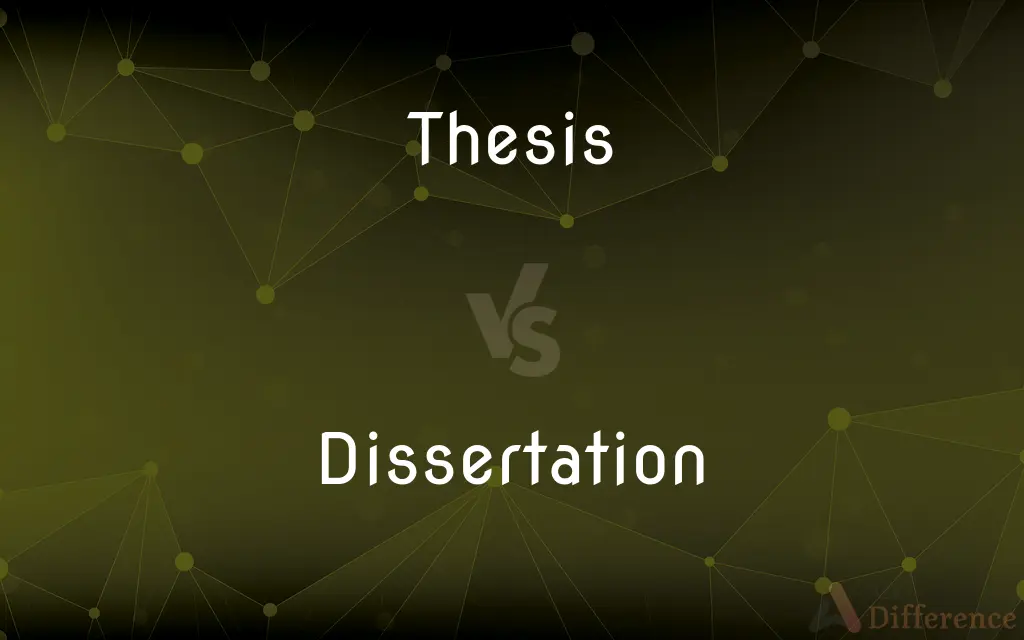Thesis vs. Dissertation — What's the Difference?
By Tayyaba Rehman & Urooj Arif — Updated on April 18, 2024
A thesis is a research project completed for a master's degree, focusing on proving a hypothesis, while a dissertation is a more comprehensive study required for a PhD, aiming to contribute new knowledge to the field.

Difference Between Thesis and Dissertation
Table of Contents
ADVERTISEMENT
Key Differences
A thesis is generally a project that master’s degree students complete, showcasing their understanding of the subject learned in the program, whereas a dissertation is a detailed research project that PhD students undertake to contribute original knowledge to their field.
The scope of a thesis is usually narrower, often aimed at testing a hypothesis by presenting new evidence or applying existing knowledge in a new way, while dissertations require a broader scope of original research and aim to introduce new theories or practices.
Methodology in a thesis might involve less complex experimental designs or simpler data analyses, focusing on specific aspects of a field, on the other hand, dissertations involve comprehensive methodologies that include detailed experimental designs, extensive data collection, and rigorous analysis.
In terms of length, theses are typically shorter than dissertations because they cover less ground in terms of research depth and breadth, whereas dissertations are lengthier due to the need to detail extensive research and its implications.
The final defense of a thesis might involve a presentation and questioning by a panel of faculty to assess understanding and application of the subject matter, while the dissertation defense is often a more rigorous process, involving a public presentation of the research findings followed by an extensive questioning period to evaluate the originality and significance of the research.
ADVERTISEMENT
Comparison Chart
Degree Requirement
Master's degree
Doctoral degree (PhD)
Primary Focus
Proving a hypothesis
Contributing new knowledge
Scope
Narrower, specific issue
Broader, comprehensive study
Methodology
Less complex, more concise
More detailed and rigorous
Length
Generally shorter
Generally longer
Defense
Panel presentation and questioning
Public presentation and extensive questioning
Compare with Definitions
Thesis
A long essay or dissertation involving personal research, written by a candidate for a master’s degree.
She defended her thesis on the impact of climate change on coral reefs.
Dissertation
A formal and lengthy discourse or treatise on some subject, using original research.
Her dissertation presented a new perspective on the role of women in wartime propaganda.
Thesis
An unproved statement, especially one serving as a premise in an argument.
The thesis of his argument was that war inevitably leads to more war.
Dissertation
A systematic, in-depth study that contributes new knowledge to a field.
The dissertation aims to fill a gap in the existing literature on genetic disorders.
Thesis
A proposition stated or put forward for consideration.
The main thesis of the book is quite controversial.
Dissertation
A long essay on a particular subject, especially one written as a requirement for the Doctor of Philosophy degree.
He is currently writing his dissertation on the history of early modern Europe.
Thesis
A statement or theory that is put forward as a premise to be maintained or proved.
His thesis was that all species adapt to their environment.
Dissertation
An extended written treatment of a subject.
His dissertation covers the topic of renewable energy sources extensively.
Thesis
A thesis, or dissertation (abbreviated diss.), is a document submitted in support of candidature for an academic degree or professional qualification presenting the author's research and findings. In some contexts, the word "thesis" or a cognate is used for part of a bachelor's or master's course, while "dissertation" is normally applied to a doctorate.
Dissertation
A detailed piece of writing exploring a complex issue.
The dissertation investigates the socio-economic impacts of urban regeneration.
Thesis
A proposition that is maintained by argument.
Dissertation
A lengthy, formal treatise, especially one written by a candidate for the doctoral degree at a university; a thesis.
Thesis
A dissertation advancing an original point of view as a result of research, especially as a requirement for an academic degree.
Dissertation
A formal exposition of a subject, especially a research paper that students write in order to complete the requirements for a doctoral degree in the US and a non-doctoral degree in the UK; a thesis.
Write a dissertation
Write up a dissertation
Hand in a dissertation
Complete a dissertation
Thesis
A hypothetical proposition, especially one put forth without proof.
Dissertation
A lengthy lecture on a subject; a treatise; a discourse; a sermon.
Thesis
The first stage of the Hegelian dialectic process.
Dissertation
A formal or elaborate argumentative discourse, oral or written; a disquisition; an essay; a discussion; as, Dissertations on the Prophecies.
Thesis
The long or accented part of a metrical foot, especially in quantitative verse.
Dissertation
A treatise advancing a new point of view resulting from research; usually a requirement for an advanced academic degree
Thesis
The unaccented or short part of a metrical foot, especially in accentual verse.
Thesis
(Music) The accented section of a measure.
Thesis
Senses relating to logic, rhetoric, etc.
Thesis
(rhetoric) A proposition or statement supported by arguments.
Thesis
(by extension) A lengthy essay written to establish the validity of a thesis (sense 1.1), especially one submitted in order to complete the requirements for a non-doctoral degree in the US and a doctoral degree in the UK; a dissertation.
Thesis
A conjecture, especially one too vague to be formally stated or verified but useful as a working convention.
Thesis
(logic) An affirmation, or distinction from a supposition or hypothesis.
Thesis
(philosophy) In the dialectical method of Georg Wilhelm Friedrich Hegel: the initial stage of reasoning where a formal statement of a point is developed; this is followed by antithesis and synthesis.
Thesis
Senses relating to music and prosody.
Thesis
The action of lowering the hand or bringing down the foot when indicating a rhythm; hence, an accented part of a measure of music or verse indicated by this action; an ictus, a stress.
Thesis
A depression of the voice when pronouncing a syllables of a word; hence, the unstressed part of the metrical foot of a verse upon which such a depression falls, or an unaccented musical note.
Thesis
A position or proposition which a person advances and offers to maintain, or which is actually maintained by argument.
Thesis
Hence, an essay or dissertation written upon specific or definite theme; especially, an essay presented by a candidate for a diploma or degree.
I told them of the grave, becoming, and sublime deportment they should assume upon this mystical occasion, and read them two homilies and a thesis of my own composing, to prepare them.
Thesis
An affirmation, or distinction from a supposition or hypothesis.
Thesis
The accented part of the measure, expressed by the downward beat; - the opposite of arsis.
Thesis
The depression of the voice in pronouncing the syllables of a word.
Thesis
An unproved statement put forward as a premise in an argument
Thesis
A treatise advancing a new point of view resulting from research; usually a requirement for an advanced academic degree
Common Curiosities
How is a dissertation different from a thesis?
A dissertation is a more extensive piece of original research aiming at contributing new knowledge to a field, typically required for a PhD, while a thesis is often shorter and completes a master’s degree.
What is the primary purpose of a thesis?
The primary purpose of a thesis is to test a hypothesis and demonstrate the student’s understanding of their field of study.
What is involved in the defense of a thesis?
The defense of a thesis typically involves a presentation to a panel of faculty members who question the student on their research and conclusions.
How important is the originality of the research in a dissertation?
Originality is crucial in a dissertation, as it must contribute new knowledge or perspectives to the field.
What types of subjects are suitable for a thesis?
Suitable subjects for a thesis are those that allow for in-depth research within a narrower framework, appropriate for master’s level study.
What role does the advisor play in the process of writing a dissertation?
The advisor guides the PhD candidate through the research process, helping refine their topic and methodology, and providing feedback on their work.
Can a dissertation lead to further academic opportunities?
Yes, successful dissertations can lead to academic positions, post-doctoral research opportunities, and further publication.
What does a dissertation defense entail?
A dissertation defense involves a public presentation of the research followed by detailed questioning to assess the originality and impact of the findings.
What are the typical lengths of theses and dissertations?
Theses are generally shorter than dissertations, often ranging from 40 to 80 pages, while dissertations can exceed 200 pages.
How long does it usually take to complete a thesis?
Completing a thesis generally takes about a year or two, depending on the complexity of the research and the requirements of the program.
Is there a significant difference in the methodology between a thesis and a dissertation?
Yes, dissertations usually require more detailed and rigorous methodologies, reflecting the depth and breadth of research expected at the doctoral level.
Can you publish articles from a thesis?
Yes, research from a thesis can be published as articles, particularly if it presents new evidence or approaches.
Are the terms "thesis" and "dissertation" interchangeable?
In some contexts, especially outside the United States, these terms can be used interchangeably, but in the US, they usually refer to different levels of academic work.
What are the research requirements for a dissertation?
The research in a dissertation must provide significant original insights and contribute new knowledge to the field, usually requiring several years of work.
What are the expectations for critical analysis in a thesis?
Critical analysis in a thesis must demonstrate the student’s ability to engage with and critique existing research, while proposing their own findings.
Share Your Discovery

Previous Comparison
Communism vs. Anarchism
Next Comparison
Chrysalis vs. CocoonAuthor Spotlight
Written by
Tayyaba RehmanTayyaba Rehman is a distinguished writer, currently serving as a primary contributor to askdifference.com. As a researcher in semantics and etymology, Tayyaba's passion for the complexity of languages and their distinctions has found a perfect home on the platform. Tayyaba delves into the intricacies of language, distinguishing between commonly confused words and phrases, thereby providing clarity for readers worldwide.
Co-written by
Urooj ArifUrooj is a skilled content writer at Ask Difference, known for her exceptional ability to simplify complex topics into engaging and informative content. With a passion for research and a flair for clear, concise writing, she consistently delivers articles that resonate with our diverse audience.
















































